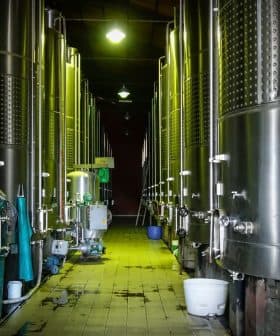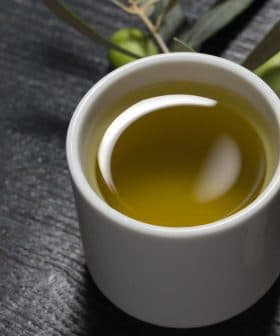EU Project Aims to Improve Mediterranean Olive Oil Sector Competitiveness
A new project will develop quality control and production techniques to aid producers while educating consumers about high-phenolic olive oil's health benefits and certifying those health benefits
 Olympia Awards 2017 Conference
Olympia Awards 2017 ConferenceThe European Regional Development Fund is supporting the ARISTOIL project, which aims to enhance Mediterranean olive oil producers’ competitiveness by developing innovative production and quality control methodologies to create olive oil with enhanced health benefits. The project includes the establishment of the World Olive Center for Health in Greece, where scientists and producers from Europe and America will collaborate to certify high-phenolic olive oils and educate consumers about the health benefits of these products.
The European Regional Development Fund is funding a five-country project which aims to increase Mediterranean olive oil producers’ competitiveness by developing and applying “innovative production and quality control methodologies leading to olive oil with enhanced health protecting properties” as recognized by EU regulation 432/2012. Part of the ARISTOIL project will be a new, non-profit World Olive Center for Health, which will involve both European and American scientists.
Prominent Greek politicians and Greek, Cypriot, and American scientists and olive oil producers attended an event at the historic old parliament building in Athens on May 11. There, Nikolaos Krimnianiotis and Prokopios Magiatis presented an overview of the project and professors shared findings from recent studies, the UC Davis Olive Center’s Dan Flynn discussed olive oil marketing, Eleni Melliou explained the role of the World Olive Center for Health, and Olympia Health & Nutrition Awards were presented to the producers of very high phenolic extra virgin olive oils.
The event introduced the European Interreg Med ARISTOIL project, which includes ten main partners from Greece, Italy, Spain, Cyprus, and Croatia, as well as several more associate partners. The ARISTOIL project description on its LinkedIn page points out that “95 percent of the world’s olive oil is produced in the Mediterranean,” where the low average price of olive oil compared with its production costs combines with competition from seed oils from other regions to create serious financial challenges in the olive oil sector.
To help alleviate these difficulties, the project will develop innovative quality control and production techniques to aid producers who wish to make especially healthy extra virgin olive oil, as well as educating consumers about high-phenolic olive oil’s health benefits and certifying those health benefits according to EU regulation 432/2012 (the only official European health claim for olive oil).
More specifically, as its LinkedIn page indicates, the project will support the production of an “innovative olive oil product … which can be used by producers for fast oil analysis in the field” to help them determine when to collect olives to produce the highest phenolic olive oil. Producers will receive clear information and a guide to olive oil production. Training sessions and seminars for olive oil producers and millers are expected to educate participants about innovative production methods and tools. “Information days” for consumers in the participating countries will inform on the health benefits of high-phenolic olive oil. Websites will reach out to consumers in other parts of the world, as project members will do at international expositions.
Seeking to develop “a ‘high-quality’ brand for olive oil produced in the Med area meeting minimum specific standards,” the ARISTOIL project will develop a standardized procedure for certification of olive oil with the EU health claim. The project will establish two certification centers, one in Spain, the other the recently announced World Olive Center for Health in Greece. Furthermore, “a Mediterranean Cluster of olive oil sector key actors will be developed … to facilitate networking and cooperation” throughout the region. Communication will be supported via a website currently under construction which will share information about “new market opportunities, exhibitions, seminars, demand and other ideas” (eventually in English and Greek).
Prokopios Magiatis, associate professor in the faculty of pharmacy at the University of Athens, explained to Olive Oil Times that the non-profit World Olive Center for Health will not only certify olive oils with health claims, but also organize the Olympia Health & Nutrition Awards for high-phenolic olive oils in collaboration with the University of Athens. Moreover, “the broader purpose of the center in the future is to perform or support research related to all aspects of olive products and health.”
Magiatis and University of Athens food scientist and chemist Eleni Melliou “will have the main responsibility for the operation of the center because it will be based in Greece,” as Magiatis reported. Founding members also include Stefanos Kales from Harvard Medical School, Diomedes Logothetis from Northeastern University’s College of Health Sciences, and Dan Flynn from the University of California Davis; more scientists will join in the future. Temporarily housed at the University of Athens, the center’s main offices will remain in Athens, with additional offices in other cities.
The Greek Deputy Minister of Rural Development and Food, Vassilios Kokkalis, attended the ceremony announcing the establishment of the World Olive Center for Health, noting that if the competitiveness of the olive oil industry in the Mediterranean is strengthened, that will also increase the income of olive growers. As Evangelos Mitrousias wrote for ERT, the public Greek radio and TV website, the ceremony for the establishment of the center was preceded by “the grafting of an olive tree from the sacred site of Pnyx with the Olympia variety from Ancient Olympia, symbolizing a journey to a new era in the land of olive oil, in Greece and internationally.”









